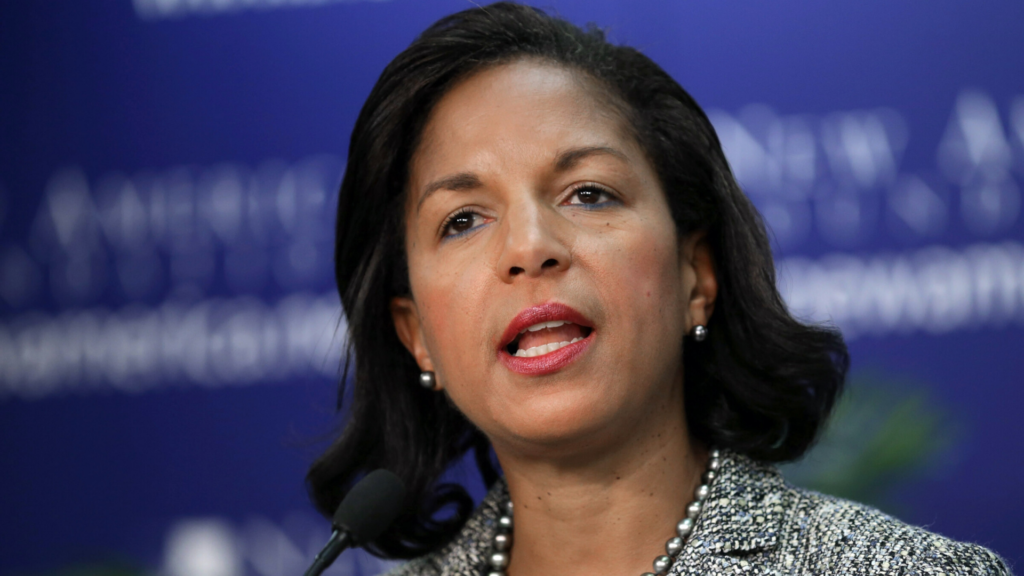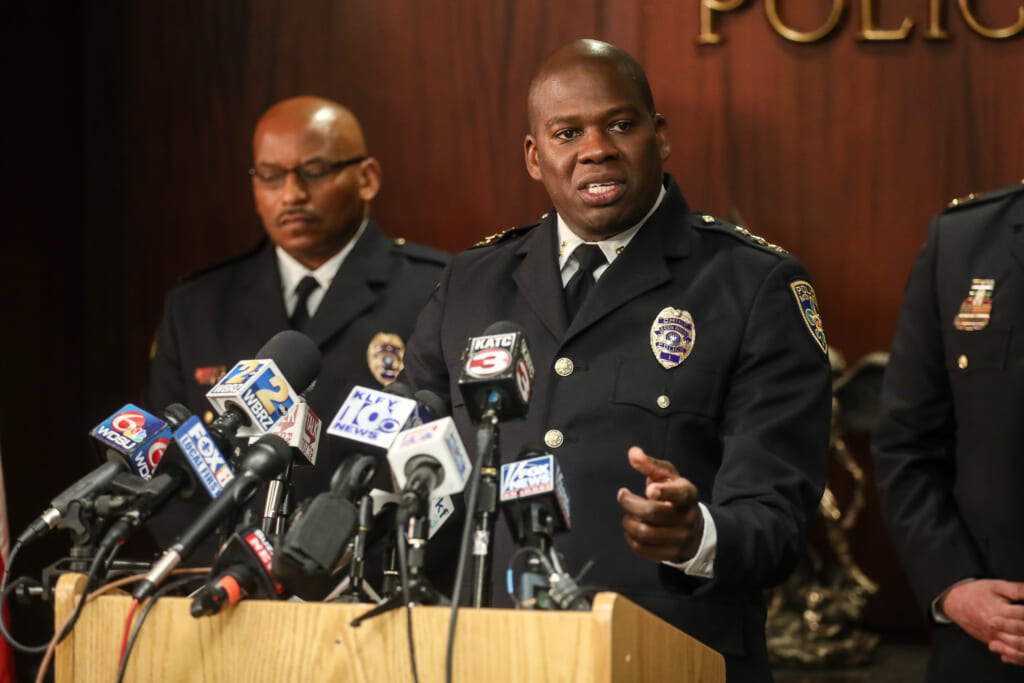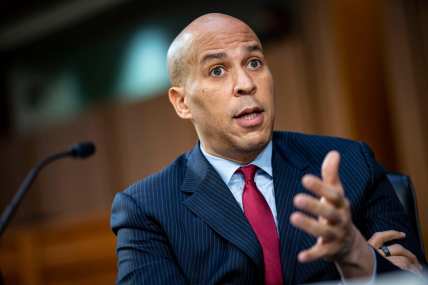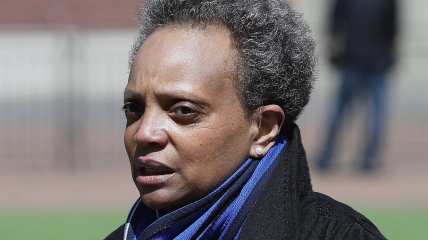Black policy advocates played role in Biden’s gun crime prevention plan
EXCLUSIVE: Advocacy groups put pressure on the Biden White House and Congress to take action on violent crime in Black and brown communities -- but from a public health perspective
President Joe Biden on Wednesday unveiled a comprehensive prevention strategy to address violent crimes mostly driven by guns and improve overall public safety.

As the nation attempts to ease its way out of the COVID-19 pandemic, homicides across the country are rising — and many of these deadly incidents are happening in Black and brown communities. In fact, communities of color made up more than 75% of all homicides. And with crime historically spiking during the Summer, it’s likely to get worse in the coming months.
The Biden administration’s strategy contains several approaches to combating violent crime by cracking down on gun trafficking, applying greater pressure on gun sellers to enforce background checks for those who purchase firearms; providing more intelligence and law enforcement resources; and through the $1.9 American Rescue Plan (ARP), providing federal dollars for programs to rehabilitate formerly incarcerated people and assist those suffering with mental health challenges. The Biden plan also provides money to fund summer youth jobs.
During his remarks on Wednesday, President Biden noted a study in Chicago, in which violence dropped by 45% after a youth program offered high school students summer jobs, adult mentors and behavioral therapy.
City mayors will play a central role in this national fight against gun violence. Baltimore Mayor Brandon Scott attended a White House roundtable with President Biden, other city mayors, chiefs of police, attorneys general and community organizers to discuss the challenges urban cities face and how the Biden administration can help.

Mayor Scott praised the executive branch’s efforts to help cities like his that are crippled by gun violence. “Baltimore is a city that has had a gun violence disease problem since before I was born. It’s what pushed me into office,” Scott told theGrio.
The 37-year-old mayor praised Biden’s commitment to invest in community-based solutions to reduce gun violence, saying “it’s music to my ears.”
Scott said that the city of Baltimore is seeing violent crimes and homicides over “petty” incidents and “things that shouldn’t result in anyone being harmed, let alone shot and killed.” That is why the Baltimore mayor is happy to see the Biden administration focusing on issues beyond policing like mental health programs and other community-based strategies.
Biden’s comprehensive public safety strategy is partially credited to his administration lending its ear to Black policy experts dedicated to ending gun violence in Black and brown communities.
Greg Jackson, national advocacy director at Community Justice Action Fund (CJAF), said he and his colleagues pushed for many of Biden’s recently announced measures.
“The first day in office when he was inaugurated, we had our first series of calls with them to start to review what are some strategies and resources and policy changes that can help us address gun violence, especially in Black and brown communities,” Jackson told theGrio.
CJAF’s advocacy on the matter included two campaigns: Invest In Us Coalition, which included other organizations like Color of Change, Everytown and Giffords; and Fund Peace, which is made up of over 140 local violence prevention and community-based organizations in cities like Detroit, Chicago and Queens, New York, that work directly with neighborhoods, victims and survivors.
”Those two campaigns have been putting pressure on the White House and Congress to take action,” said Jackson.
What’s most significant about Biden’s gun crime prevention strategy is that rather than just providing federal dollars toward traditional public safety like law enforcement and the criminal justice system, it also intentionally focuses on violent crime as a public health issue.
“Just like the opioid crisis, just like COVID-19, you need a comprehensive strategy. You can’t just incarcerate your way out of it,” added Jackson.
In their efforts to influence Biden’s policy agenda, Jackson said that his organization also facilitated a three-hour meeting with former U.S. Ambassador Susan Rice, who currently serves as director of the White House Domestic Policy Council, and violence intervention groups dedicated to providing healing for those impacted by trauma, and providing mental health therapy to Black neighborhoods that were impacted by violence. Rice also met with survivors of violent crimes.

For their part, Democrats on the Hill introduced on Thursday the Break the Cycle of Violence Act, which would award $5 billion in grants to community-based, nonprofit organizations and local governments. The bill, which was first introduced by Sen. Cory Booker in the last session of Congress, would also create an Office of Community Violence Intervention at the Department of Health and Human Services to implement the legislation if passed into law; and $1.5 billion in funding for job training, education, apprenticeship, skilled trades training, or other paid or unpaid work for youth in communities disproportionately impacted by violence.
The focus in Washington on crime comes as violent crimes rise and while distrust for police in Black and brown communities persist.
Biden’s gun crime prevention strategy, which would also include funding for law enforcement, drew the ire of activist organizations like Movement for Black Lives. Despite policies geared toward addressing socio-economic problems in Black and brown communities, the coalition of Black organizations said Biden’s plan “puts the lives of millions of Black and Brown people at risk by increasing the already looming and violent police presence in our communities.”
“Despite bloated police budgets across the country, crime continues to occur because the police do not keep us safe, and they do not prevent nor stop crime. Pouring more money into the system of policing only threatens the very lives they’re purported to protect,” said Karissa Lewis, national field director of Movement for Black Lives in a statement.
There has been a growing debate in communities of color over the issue of policing and funding. At the height of the Black Lives Matter demonstrations in 2020, there were calls to “defund the police,” which remains a topic that has divided not just the left from the right, but even within the Democratic Party. Additionally, Republicans and Democrats have yet to come up with a compromise on the George Floyd Justice in Policing Act — a bill even some activists say doesn’t move the needle on addressing the issue of police misconduct.
Baton Rouge, Louisiana Police Chief Murphy J. Paul Jr., who also attended the White House roundtable on Wednesday, acknowledged that there is a need beyond policing to address public safety issues in Black communities. While he doesn’t support defunding the police, he told theGrio that he does believe police departments should do a yearly review of their budgets to make “appropriate adjustments for an ever-changing society.”

The reality, said Paul, is that retraining police officers to better do their jobs costs money. The police chief also admitted that officers are “not equipped” for issues of mental illness. However, in response to the public health concern, his city created a “stabilization center” called Bridge Center for Hope.
“So now our police officers, when we interact with someone who’s experiencing whether it’s a call for service, whether you as a family member need help because your loved one is experiencing it, you don’t necessarily have to call law enforcement,” Paul told theGrio.”There’s a mobile team that will come out and also respond that is helping in so many ways because now we’re able to get the help that they need.”
Biden’s crime prevention strategy would fund similar programs.
Greg Jackson of Community Justice Action Fund, said Biden’s public safety strategy is something that has been years in the making. He also noted the evolution of leaders on the issue of crime since the controversial Violent Crime Control and Law Enforcement Act of 1994, also known as the 1994 Crime Bill, which led to a “tough on crime” justice system and the mass incarceration of Black and brown men. Despite its intent to address the drug epidemic, Jackson said “it didn’t work.”
“I think this moment has been refreshing for so many people because we’re watching leaders at every level look at this from a comprehensive perspective and really, frankly, learn from their mistakes and really commit to taking this on with the public funding and investing in solutions that put people first,” he said. “Look at crime control and law enforcement as one part of the puzzle. But the entire puzzle is the public health puzzle.”
Have you subscribed to theGrio’s “Dear Culture” podcast? Download our newest episodes now!
TheGrio is now on Apple TV, Amazon Fire and Roku. Download theGrio.com today!


